Project Surya and Mobile-Phone Technology: Gathering Data for a Healthier Planet and Healthier People
View our flyer
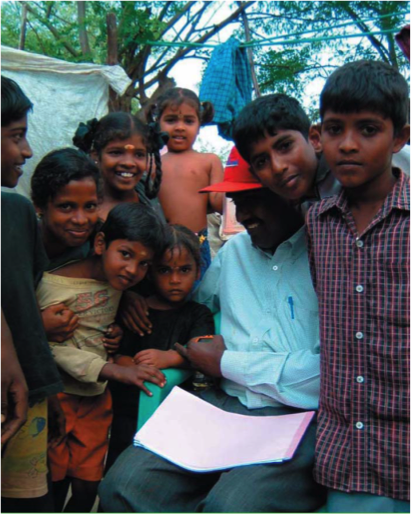 Working with its partners, Project Surya will use cutting-edge, mobile-phone-based tools to transform livesA New Way to Tackle an Old Problem
Working with its partners, Project Surya will use cutting-edge, mobile-phone-based tools to transform livesA New Way to Tackle an Old Problem
Mobile-phone technology is a critical component of Project Surya's potential to mitigate climate change, improve public health, and contribute to economic uplift in the developing world. Project Surya proposes the use of mobile phones to measure climate mitigation and health outcomes in an unprecedented way. At present, most health data collection, and even much field-based scientific data collection in general, relies on sparse measurements that potentially miss important climate- and health-related events. The penetration and sophistication of mobile phones makes it possible to collect near-continuous, accurate datasets that were never possible before at large scale, allowing non-scientists to collect credible data.
Over 4 billion people worldwide use mobile phones, and most newer models can record and transmit sound, images, location, and motion data. By combining these data with Web services to aggregate and interpret the assembled information, mobile phones can be 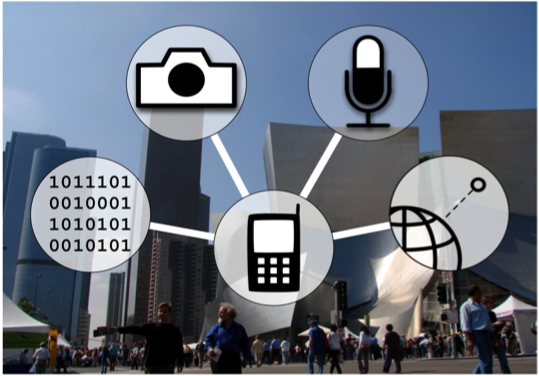 Multi-media capabilities of mobile phones will be leveraged (graphic used with permission from UCLA Center for Embedded Networked Sensing. Background photo: Puck90 Flickr Photostream - http://www.flickr.com/photos/puck90/263718191/in/set-72157594318848790/)powerful proxies for sensors. Given that mobile phones are now powerful multi-media devices with cameras and GPS capabilities in addition to voice and Internet access, mobile phones can transform scientific data collection without the need for the high bandwidth, rich sensor capabilities, or local processing infrastructure that had previously been barriers to collection of data in rural, developing regions.
Multi-media capabilities of mobile phones will be leveraged (graphic used with permission from UCLA Center for Embedded Networked Sensing. Background photo: Puck90 Flickr Photostream - http://www.flickr.com/photos/puck90/263718191/in/set-72157594318848790/)powerful proxies for sensors. Given that mobile phones are now powerful multi-media devices with cameras and GPS capabilities in addition to voice and Internet access, mobile phones can transform scientific data collection without the need for the high bandwidth, rich sensor capabilities, or local processing infrastructure that had previously been barriers to collection of data in rural, developing regions.
Measuring Black Carbon
If data collection has traditionally been difficult in general in rural regions, it has been prohibitively expensive when it comes to measuring black carbon (BC) concentrations. Because BC was only recently identified as a key culprit in the global warming picture, an affordable digital sensor capable of measuring BC concentrations does not yet exist.
However, working with our partners at the Center for Embedded Network Sensing (CENS) at UCLA and at Nexleaf Analytics, Project Surya will design a mobile phone platform to measure BC concentrations and collect the climate and public-health data that can make a difference. This transformation off-the-shelf mobile phones into leading-edge data collection instruments will enable residents to provide our scientists with data that will greatly enhance the ability to study climate and health impacts, and therefore to positively impact lives in the areas where Project Surya is implemented.
How Climate Data Will be Collected
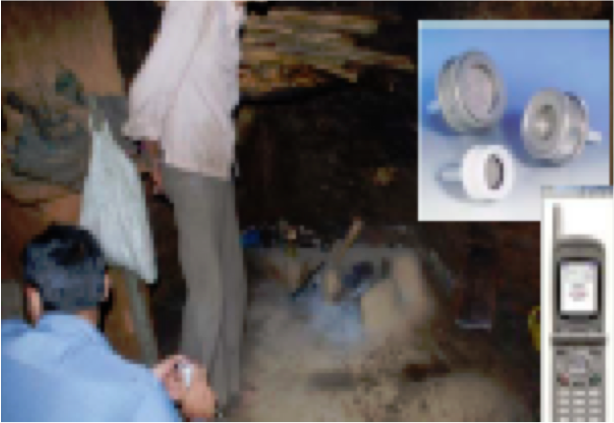 Specially designed filters change color based on indoor BC levels
Specially designed filters change color based on indoor BC levels
Black carbon (BC) concentrations indoors will be captured by processing images of filters installed in each household. Project Surya will install special filters (shown at left) and calibrated color charts (shown below) in each household that record aggregate BC levels. The filter color corresponds to a range of BC concentrations emitted over a day and the color chart is used to associate the filter color with a BC concentration level. Individuals will use the camera on the mobile phone to capture and transmit an image containing the air filter and color chart to a server, at which point an algorithm on the server will interpret the image of the filter to automatically compute the daily BC concentrations for that household.
Each day, the mobile phone will wirelessly upload a 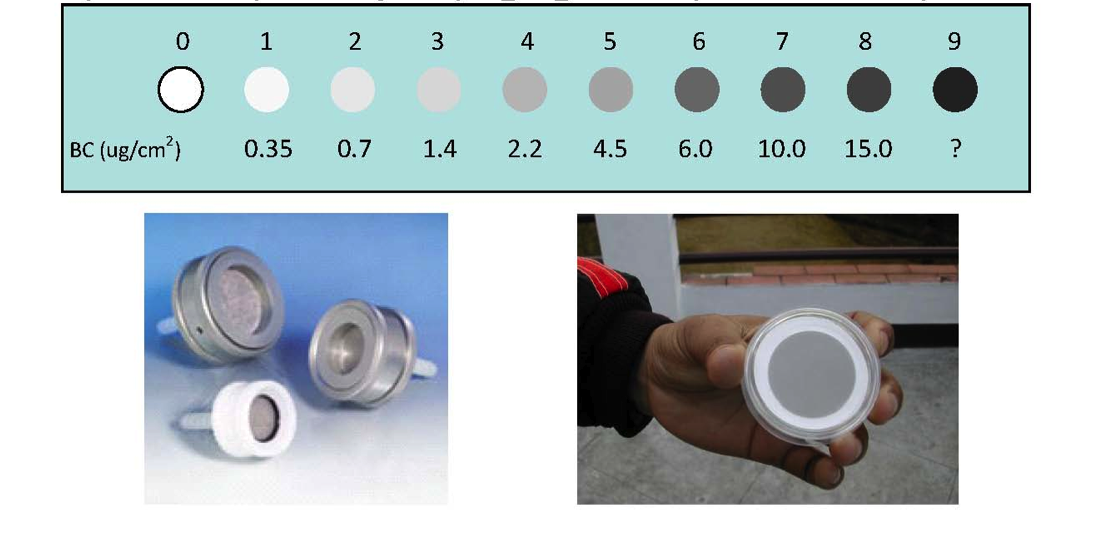 Color charts in concert with filters will record indoor BC levelscontinuous time series of the data to a server, where it will be made available to climate and health researchers. Researchers will use the data streams to evaluate the intervention's impact on regional and global climate change, and its impact on individual pollution exposure and public health.
Color charts in concert with filters will record indoor BC levelscontinuous time series of the data to a server, where it will be made available to climate and health researchers. Researchers will use the data streams to evaluate the intervention's impact on regional and global climate change, and its impact on individual pollution exposure and public health.
This new, cell-phone-based data collection tool will improve on traditional data collection technologies by reducing the cost of data, and increasing the amount and frequency of data being collected.
How Public Health Data Will be Collected
The mobile phones will also measure individual reductions in exposure to pollutants that result from Project Surya's introduction of cleaner cooking technologies.The goal of the exposure assessment exercises would be primarily to document the range of exposure reduction achieved during everyday use of household interventions and develop models to estimate exposures that could be widely applied over larger geographical and socio-cultural domains within India.
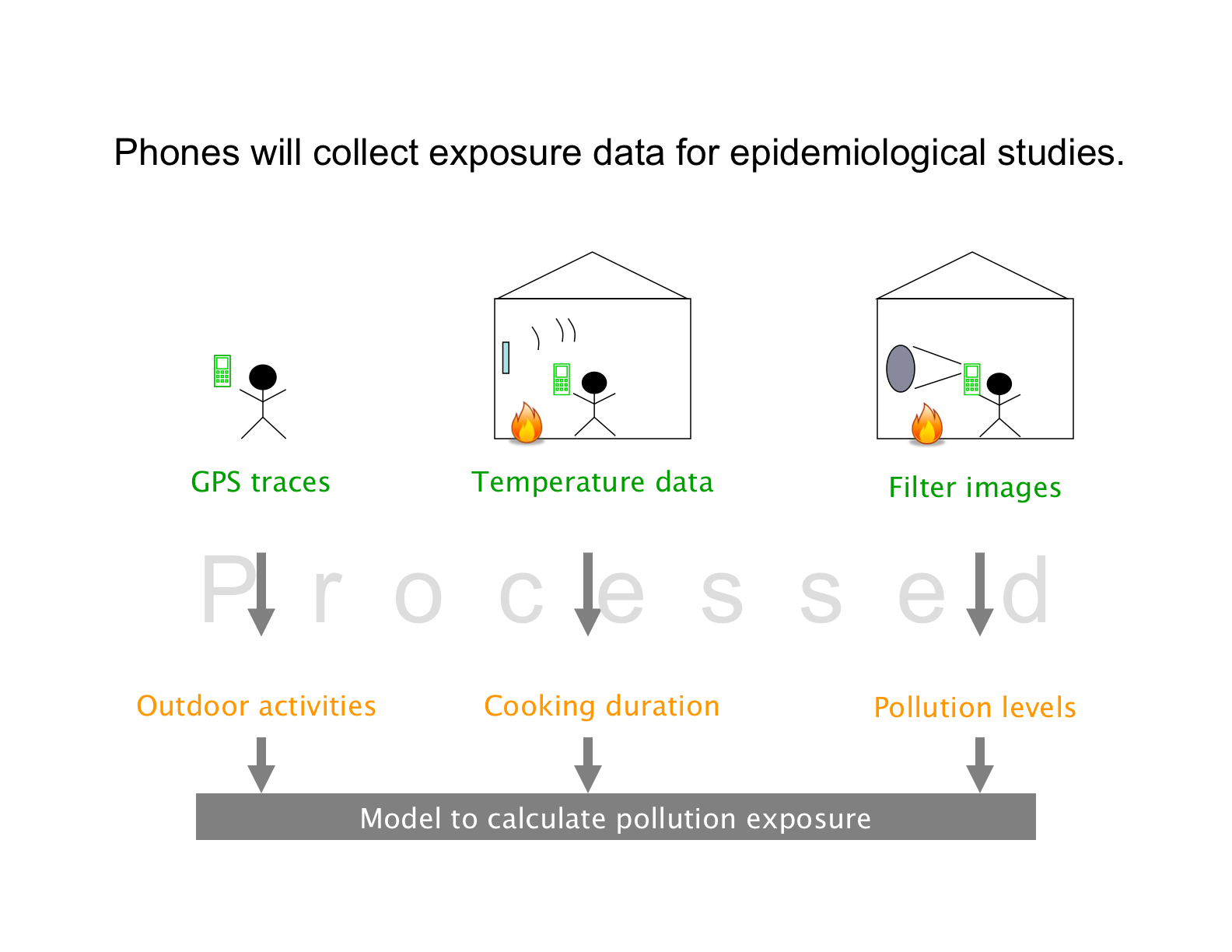
Useability
Simple easy to use interfaces will allow users to capture and transmit scientifically useful dataThe mobile phone platform will be designed to operate in a rural, developing region. The mobile phone interfacewill be text-free and solely based on icons, in order to accomodate a variety of literacy levels. The network infrastructure will be designed to operate even in the presence of irregular power and communication. And the software will aim to automate as much as possible, in order to minimize the burden on the user's part in the form of manual data entry.

Next: Scaling Up
